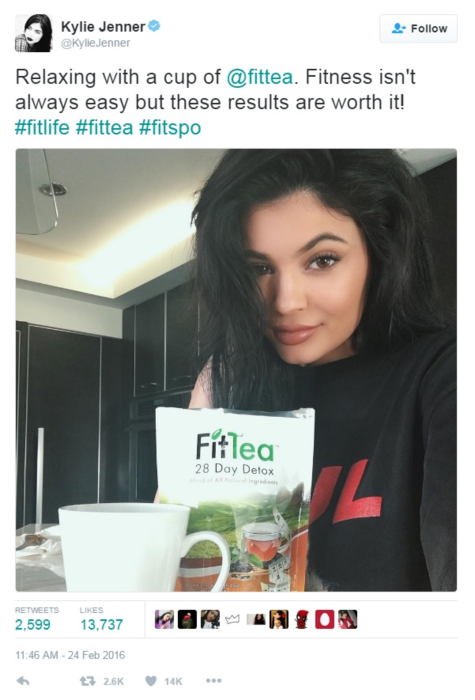#notanad
In March 2017, the Federal Trade Commission sent “educational” letters to 46 celebrities who it believed weren’t properly disclosing payment for posts on Instagram. Since then, however, all but one of these celebrities have continued to post ads that are not FTC-compliant, according to the advocacy group Public Citizen.
Public Citizen tracked the 46 celebrities who had received the letters from May 1 to June 12. The result? All but two of them (basketball player Allen Iverson and NFL player James Harrison) posted more ads, totaling 412 ads, 79% of which were not properly disclosed.
The advocacy group subsequently sent a new letter to the FTC asking the organization to not only punish brands but individual celebrities for undisclosed marketing on social media. Public Citizen asks the FTC to conduct a broad investigation into the current state of influencer marketing, including working with Instagram to come up with a better solution than the new “paid partnership with…” feature.
Influencer marketing attracted unwelcome attention recently. Fyre, a live entertainment booking service, in conjunction with several celebrities and entrepreneurs, promised in boisterous social media campaigns to deliver a musical festival experience of the decade, but the event turned sour.
The FTC has yet to respond directly to the letter, but Jessica Rich, director of the FTC’s Bureau of Consumer Protection, told DMN: “Consumer have the right to know if reviewers are providing their opinions or paid sales pitches.”
The organization did not comment on the letter, nor did it comment on whether it will take Public Citizen’s advice and open an investigation or any other enforcement actions.
How the FTC would source and investigate improper disclosures is unclear. Celebrities now have their hands in many pots and invest in many companies, so what constitutes an “advertisement” is an ever-changing description.
According to 2015 FTC Social Media Guidelines, proper disclosure of sponsored posts:
- Must communicate sponsorship in clear, unambiguous language, and appear at the beginning of posts (or “above the fold”) if possible.
- Should be easy to read and in a shade that stands out from the background.
- Needs to remain on the screen for long enough to be noticed and read, if sponsored content is a video.
- Must be included even if the influencer is negatively reviewing a product or service.
- Should be visible on all devices.
These guidelines are useful. However, Allison Fitzpatrick, a partner in the Advertising, Marketing & Promotions Practice Group of Davis & Gilbert, recommended the FTC update them as new platforms emerge.
“It would also be helpful if the FTC could provide more specific guidance for making appropriate disclosures on new social media platforms as they become more mainstream, such as Snap, Meerkat and Periscope, or as new features develop on social media platforms, such as Instagram Stories,” says Fitzpatrick.
The FTC’s recent track record has been to go after the advertiser, not the influencer or celebrity, in instances of improperly attributed advertising.
In March 2016, for example, national retailer Lord & Taylor agreed to settle with the FTC over charges that it deceived consumers by paying for native ads without disclosing that the posts were actually paid promotions for the company’s 2015 Design Lab clothing collection. Four month later, Warner Bros. Home Entertainment settled with the FTC over charges that it deceived consumers during a marketing campaign for the video game Middle Earth: Shadow of Mordor, by failing to adequately disclose that it paid online “influencers.”
The issue with non-disclosed advertising through influencers, as the letter states, is that citizens have a right to know when they are targets of advertising.
“Public Citizen’s important new research reveals that the FTC is failing to protect American consumers from acts of digital deception conducted by marketers,” says Jeff Chester, executive director of the Center for Digital Democracy. “Young people are especially vulnerable to these stealth influencer Instagram marketing campaigns. The commission should open up an investigation and, we believe, force Instagram and its marketing partners to stop deceiving the public.”
When there are thousands of posts a day from celebrities, it’s difficult for a social platform monitor all posts and determine what is organic and what is paid.
If the FTC intends on enforcing these guidelines, however, it must consider the evolution of social media space and its place in it. In such a rapidly-changing space of social network platforms, should the FTC only develop guidelines once a year? Is it time for the FTC to create social media site-specific guidelines? Should the FTC charge influencers? These are all questions the FTC needs to answer if it wants to remain ahead of the curve on this issue.








